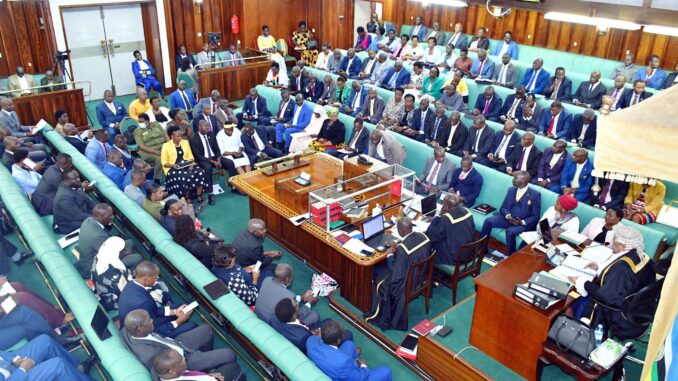
Uganda’s parliament on Wednesday approved three loans amounting to over Ush5.2 trillion ($1.38 billion) including Ush3.5 trillion ($927.2 million) from local commercial banks to fund the supplementary budget, Ush1.23 trillion ($325.83 million) from World Bank for smart agriculture and Ush554.7 billion ($146.9 million) from China to finance the e-government infrastructure project phase.
The latest loan requests push the country’s debt further, which by the end of August 2023 stood at over Ush88.8 trillion ($23.5 billion).
Majority of MPs from the ruling National Resistance Movement (NRM) led by the Parliament Speaker Anita Among brushed off resistance put up by opposition lawmakers and passed the budget.
Read: Uganda turns to local market for funding after freeze
“The committee recommends that the proposal to borrow up to Ush554.7 billion from the Export-Import Bank of China to finance the supply, installation, commissioning and support of the National Data Transmission Backbone Infrastructure/E-Government Infrastructure Project Phase V, be approved subject to the recommendations herein,” the committee report read.
In the same vein, the committee also recommended the approval of $325 million for the climate-smart agriculture project without a hitch.
“The committee therefore recommends that the request by the government to borrow up to $325 million and receive a grant of up to Ush1.23 trillion from the International Development Association (IDA) of the World Bank Group to finance the Uganda Climate Smart Agricultural Transformation Project (UCSATP), be approved subject to the recommendations herein.”
However, opposition members put up a fight when it came to the request to borrow Ush3.5 trillion to finance the supplementary budget, arguing that some of the money the government was planning to borrow was already available and saw no reason for borrowing.
The government had tabled a supplementary request of Ush1.9 trillion ($503.3 million) for approval by parliament before spending and another Ush1.56 trillion ($413.2 million) within the 3 percent limit authorised by the law.
However, while the Ush1.56 trillion had already been spent and brought to parliament for retrospective approval, the government in its request to borrow included the same amount.
However, Muwanga Muhammad Kivumbi, the shadow minister of Finance, accused the government of spending in anticipation, which he said is a financial indiscipline.
Read: MPs find ‘rot’ in Uganda’s NSSF
“You cannot borrow when part of the money is already within. Our departure from the majority report is that while the government sought to revote money that was swept back at the end of the last financial year, which is already available, it is again going to borrow the same money which it has. How possible is this?” he questioned.
In the minority report, the committed faulted the government for financial indiscipline which they said if not checked would lead to disaster.
The government rubbished this argument, saying the money that was swept back at the end of the last financial year is not available and what it is seeking is new money.
A minority report said this gives leeway to the government to spend the taxpayers’ money with impunity and commit the country to further debt distress. They particularly took issue with the state house that over the years has been the biggest beneficiary of the supplementary budget.



